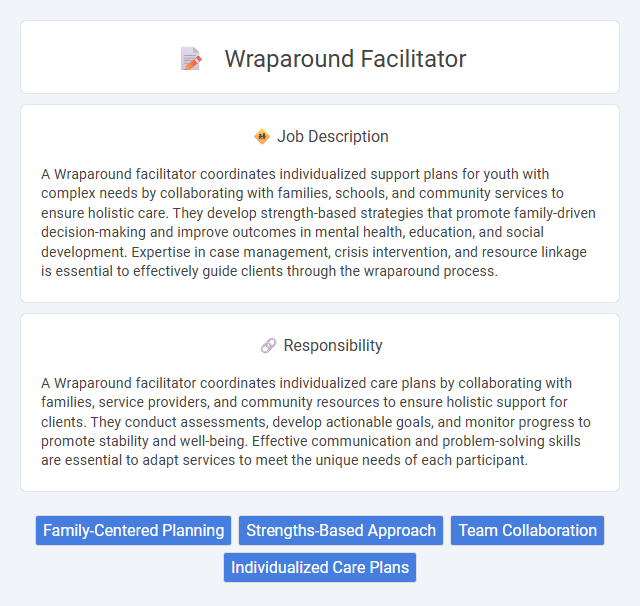
A Wraparound facilitator coordinates individualized support plans for youth with complex needs by collaborating with families, schools, and community services to ensure holistic care. They develop strength-based strategies that promote family-driven decision-making and improve outcomes in mental health, education, and social development. Expertise in case management, crisis intervention, and resource linkage is essential to effectively guide clients through the wraparound process.
Individuals who demonstrate strong empathy, patience, and excellent communication skills are likely suitable for the Wraparound facilitator role, as it involves coordinating care for people experiencing complex challenges such as mental health issues, substance abuse, or family instability. Candidates with a background in social work or counseling may have a higher probability of success due to the need for understanding diverse client needs and building trust. Those who struggle with managing high-stress situations or lack flexibility might find the demands of this job overwhelming.
Qualification
A Wraparound facilitator must have strong interpersonal and communication skills, with a background in social work, psychology, or a related human services field often required. Certification in Wraparound facilitation and experience in family-centered, strengths-based planning enhances effectiveness in coordinating community resources and support. Proficiency in crisis intervention, cultural competency, and knowledge of local social services ensures comprehensive care and successful client outcomes.
Responsibility
A Wraparound facilitator coordinates individualized care plans by collaborating with families, service providers, and community resources to ensure holistic support for clients. They conduct assessments, develop actionable goals, and monitor progress to promote stability and well-being. Effective communication and problem-solving skills are essential to adapt services to meet the unique needs of each participant.
Benefit
A Wraparound facilitator likely provides significant benefits by coordinating personalized care plans that address the unique needs of individuals and families. This role probably enhances access to community resources, resulting in improved emotional, social, and behavioral outcomes. By fostering collaboration among service providers, the facilitator may help reduce service gaps and promote holistic support systems.
Challenge
A Wraparound facilitator likely faces the challenge of balancing diverse family needs while coordinating multiple service providers, which requires strong communication and problem-solving skills. Managing resistance from clients or agencies may complicate creating tailored support plans, potentially impacting engagement and progress. Navigating limited resources and time constraints might also make it difficult to ensure consistent follow-through and positive outcomes.
Career Advancement
A Wraparound facilitator plays a crucial role in coordinating community-based services for children and families, enhancing their skills in case management, communication, and crisis intervention. Gaining expertise in trauma-informed care and cultural competency can significantly elevate career prospects, opening opportunities for leadership roles or advanced positions in social services and mental health organizations. Certifications such as Certified Wraparound Facilitator (CWF) contribute to professional growth and higher earning potential in this specialized field.
Key Terms
Family-Centered Planning
A Wraparound facilitator specializes in coordinating comprehensive, family-centered planning to address the unique needs of children and families in complex situations. They collaborate with families, service providers, and community resources to develop personalized care plans that emphasize strengths, cultural values, and shared decision-making. This role requires expertise in building trusting relationships and ensuring all voices are heard to achieve sustainable, positive outcomes for the family unit.
Strengths-Based Approach
A Wraparound facilitator employs a Strengths-Based Approach by identifying and leveraging the unique talents, resources, and potential of individuals and families to create personalized support plans. This method emphasizes collaboration and empowerment, fostering resilience and self-sufficiency rather than focusing on deficits or problems. By harnessing community assets and promoting positive outcomes, the facilitator enhances overall well-being and sustainable success for participants.
Team Collaboration
Wraparound facilitators coordinate multidisciplinary teams to develop individualized care plans, ensuring seamless communication and resource integration. They foster collaboration among families, service providers, and community stakeholders to address complex needs comprehensively. Effective team collaboration enhances outcome-driven strategies and supports holistic youth and family well-being.
Individualized Care Plans
Wraparound facilitators develop and implement individualized care plans tailored to the unique needs of each client, ensuring a holistic approach to support. They coordinate services across multiple systems, including mental health, education, and social services, to promote effective outcomes. Data-driven adjustments to care plans maximize client engagement and long-term success.
 kuljobs.com
kuljobs.com